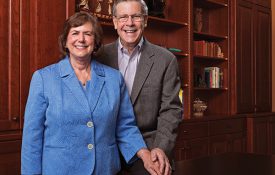-

Ed Diener, Who Studied Happiness, Dies
The founding editor of APS’s Perspectives on Psychological Science journal, he received the APS William James Fellow Award in 2013.
-
Losing Our Other Significant Others: Without Social Interaction, Many are Placing Unrealistic Expectations on Live-in Partners
... After a year locked down, many Canadians find their community ties weakened. The characters who used to populate everyday life – work colleagues, gym buddies, craft groups, pub friends, local business owners – have dimmed from view. Together, they formed a community of “other significant others”– OSOs for short – the people we turn to for a multitude of social and emotional needs. Social psychology professor Eli Finkel coined the term to describe people who help us outsource, so we don’t overwhelm our romantic partners.
-
Need to Dust Off Your Social Skills?
As we move through the spring of The Great Vaccination, many of us are feeling cautious optimism, and also its flip side: creeping dread. Maybe you have a sense of ambivalence about how to interact with others again. If you used to work in an office, you might be worried about returning to work — but eager to see people again. Or you find yourself having to confront a neighbor about a longstanding problem — but you’re out of practice with conflict resolution.
-
You’re Gonna Miss Zoom When It’s Gone
If there’s a villain of the pandemic, other than COVID-19, it’s probably Zoom. The videochatting platform is making people tired, it’s making people awkward, and it’s making people sick of their own faces. Zoom is such a shoddy substitute for real life that, according to one survey, nearly one in five workers has illicitly met up in person with colleagues to discuss work. And in another poll, a third of women said they were “talked over, interrupted or ignored more frequently” in virtual meetings than in person. ...
-
Why Adults Lose the ‘Beginner’s Mind’
Here’s a sobering thought: The older we get, the harder it is for us to learn, to question, to reimagine. This isn’t just habit hardening into dogma. It’s encoded into the way our brains change as we age. And it’s worsened by an intellectual and economic culture that prizes efficiency and dismisses play. Alison Gopnik is a professor of psychology and philosophy at the University of California, Berkeley, where she runs the Cognitive Development and Learning Lab; she’s also the author of over 100 papers and half a dozen books, including “The Gardener and the Carpenter” and “The Philosophical Baby.” What I love about her work is she takes the minds of children seriously.
-
The False Promise of Quick-Fix Psychology
It would be hard to find a scientific field that has enjoyed as much mainstream success in the 21st century as social psychology. Social psychologists dominate the TED Talk stage, rack up impressive contracts as consultants to schools and companies, and write book after bestselling book. Their most viral ideas promise to solve some of society’s most pressing problems, often in slickly counterintuitive ways. Amy Cuddy (61 million TED Talk views) argued that by adopting brief, expansive poses—think Wonder Woman with her hands on her hips—women could feel more powerful in the workplace, shrinking stubbornly persistent gender gaps.

